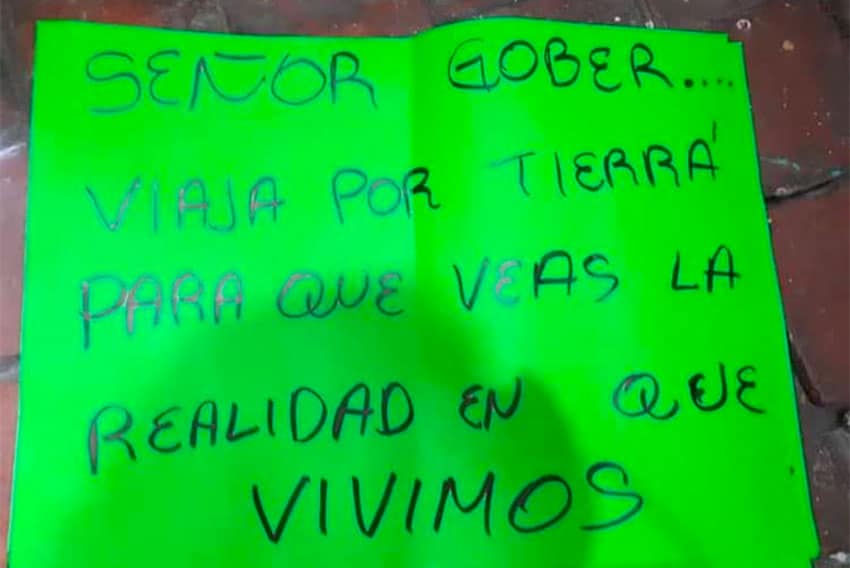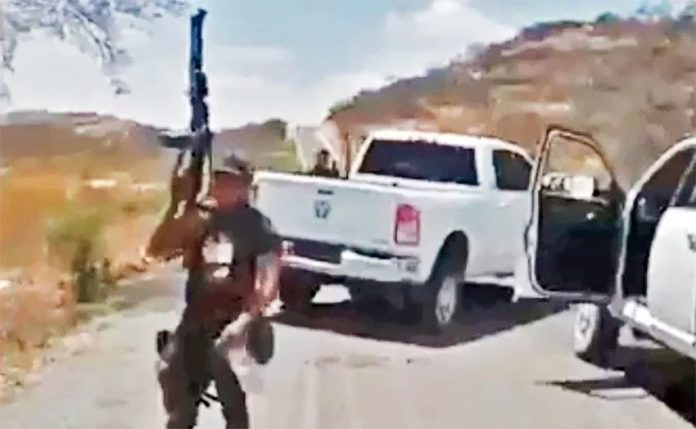Michoacán Governor Silvano Aureoles has finally conceded that the town of Aguililla is being held hostage by two feuding criminal organizations.
In an interview with Milenio Television, Aureoles publicly acknowledged for the first time that the Jalisco New Generation Cartel (CJNG) and the Cárteles Unidos are engaged in a turf war in the town, located about 270 kilometers southwest of Morelia in Michoacán’s notoriously violent Tierra Caliente region.
His acknowledgement comes after weeks of clashes between the two criminal groups in Aguililla, including one in which the CJNG is believed to have killed as many as 27 members of the Cárteles Unidos.
The governor said the dispute is affecting ordinary residents who have nothing to do with either criminal group.
Aguililla has been “highjacked” and cut off by the cartels, Aureoles said, asserting that both organizations have blocked access to the municipality.

According to residents who spoke with the newspaper Reforma, the Cárteles Unidos has been blocking access to Aguililla for at least four months to stop further CJNG incursions. The former group is only allowing people in and out of the municipality via one road at specific times, they said.
“They only open it twice a day [in the morning and evening], it doesn’t matter if someone is dying,” a resident said.
The blockades have created shortages of essential products such as food, medicines and gasoline and forced prices up. Residents also complained that they can’t access health and financial services.
“We’re without gasoline, banks, even municipal police,” a resident said. “Someone could die from a scorpion sting because of the [long] transportation times and because there is not enough medicine in the municipality.”
The root cause of the violence, the blockades and the consequent shortages of basic goods is that both the CJNG and the Cárteles Unidos want to control production of synthetic drugs in Aguililla as well as trafficking routes running through the municipality, Aureoles said.
“This region has a decades-long history of the cultivation of illicit plants but now … [the main activity] is the production of synthetic drugs” such as fentanyl, the governor said, explaining that chemical precursors – many of which are shipped to Pacific coast ports from Asian countries – come into Aguililla and manufactured synthetic drugs go out.

He said the state government is in talks with municipal authorities and federal security forces to find a solution to the conflict and the blockades that have effectively turned residents into “hostages.”
The governor called on President López Obrador to provide more federal government support.
“It’s necessary. … It’s a very complex issue that is obviously [created by] organized crime,” he said, adding that it is very difficult for the state government to combat the problem on its own because of the immense firepower of the cartels, their high levels of organization and their ample economic resources.
Although some media reports have said that the CJNG has seized Aguililla, Aureoles said that neither it nor the Cárteles Unidos has full control. They are in a battle to try to drive each other out, he reiterated.
The only way to defeat them is to “go in together … with federal forces,” he declared.
However, that is unlikely to happen because of López Obrador’s desire to avoid violent confrontations with criminals, Aureoles said, adding that it will be difficult to control or contain the cartels “only with calls to civility or dialogue.”
“Political dialogue is difficult with these guys; dialogue is possible with communities in conflict, with social groups but talking with criminals is very difficult,” he said.
Despite those remarks, the governor expressed confidence that the problem will be resolved within days.
The three levels of government are putting together a plan to deal urgently with the shortages of food, medications and other essential goods, he said.
“I believe that we’ll soon resolve this blockade problem, that’s been going on for weeks. … It’s a matter of days,” Aureoles said.
The president told reporters Wednesday that efforts to address insecurity in Aguililla “have been advancing” but continued to insist that the use of force is not an option.
